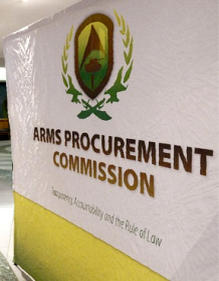|
Getting your Trinity Audio player ready...
|
 By Lee-Ann Alfreds
By Lee-Ann Alfreds
While contracts, national industrial participation programmes, defence industrial participation programmes, credits, multipliers, scores and offsets have had a lot of airing at the Arms Procurement Commission taking place in Pretoria, they are not the word that has been heard most frequently over the last eight months. That word is adjournment.
For since the commission – which is investigating allegations of wide-scale fraud and corruption in South Africa’s multi-billion rand purchase of arms in 1999 – kicked off its public hearings on 5 August last year, it has been adjourned 18 times, with the first postponement taking place upon kick-off. The last postponement was on 24 March. The commission has adjourned eight times this year alone since it returned from the festive season break on 20 January.
While the reason for the adjournments has ranged from the resignation three days ahead of the start of the proceedings of one of the commissioners, to the venue – the Tshwane Council Chamber at the Sammy Marks Conference Centre – not being available, to chairperson Judge Willie Seriti being sick, the two most common reasons for the delays have related to the declassification of classified documents which were accessible to a handful of people, and the disclosure of documents.
In fact, the declassification of documents contributed greatly to the first adjournment, for two weeks, at the outset of the hearings in August. Just minutes into the proceedings, they were postponed so the commission could decide how to handle the matter of declassification, as most of the information available to it is related to defence and has been classified.
The declassification of documents continues to be considered on a case-by-case basis as and when the commission or an interested party requests that it be done.
The second bugbear the commission has had to deal with has been the disclosure of documents to interested parties. The most recent delay was because of a request by arms deal whistleblower Richard Young that all information in the possession of the commission, the Department of Defence and others be disclosed to him. Young had also asked not to have to disclose all information in his possession to Armscor. The commission denied his request at the end of March.
These delays have led to concerns that the commission will not complete its work before its mandate expires in November. In terms of the proclamation President Jacob Zuma issued, the commission was initially supposed to have completed its work within a two-year period, which ended in November last year. The commission was given an extension of one year.
Proceedings are under control
Commission spokesman William Baloyi this week insisted all was on track.
“Reasons are varied and are not limited to the problems around declassification of and demand for documents. The last adjournment on the 24th March 2014, for instance, was due to the fact that our evidence leaders needed time to prepare the next witnesses to be called. It is in the nature of such commissions that problems are bound to arise from time to time necessitating in an adjournment and each new problem will be addressed on its merits.
“I am confident that the commission will meet the deadline given to it. It is unnecessary to say anything further,” said Baloyi in a statement to Corruption Watch.
The commission announced in January that it had allocated 80 days between 20 January 20 and 16 May to completing the first phase of public hearings which had initially been expected to be concluded by the end of last year. The first phase is investigating the rationale behind the deal, whether the arms are being under-utilised or utilised at all and whether the promised investment was realised.
Among the witnesses scheduled to testify in the first phase are former defence minister Mosiuoa Lekota and former deputy defence minister Ronnie Kasrils (they were scheduled to take the stand from late March to early April), and former finance minister and current planning minister Trevor Manuel and former treasury director-general Maria Ramos (who were part of the treasury delegation to be interrogated from 9-30 April). The government's former chief arms deal negotiator Jayendra Naidoo is scheduled to testify from 5-9 May while former president Thabo Mbeki was expected to be on the stand from 12-16 May.
The commission is set to adjourn at the end of the first phase to “analyse and assess the evidence and make provisional factual findings to be incorporated in the next interim report”.
The second phase, initially set down for 3 March to 31 May, will deal with allegations of impropriety, fraud and corruption in the acquisition process and witnesses subpoenaed include Young, arms deal activist Terry Crawford-Browne, authors Hennie van Vuuren and Paul Holden and former ANC MP Andrew Feinstein. Alleged beneficiaries and people implicated in wrongdoing, like Fana Hlongwane, the former advisor to defence minister Joe Modise, will also testify.





